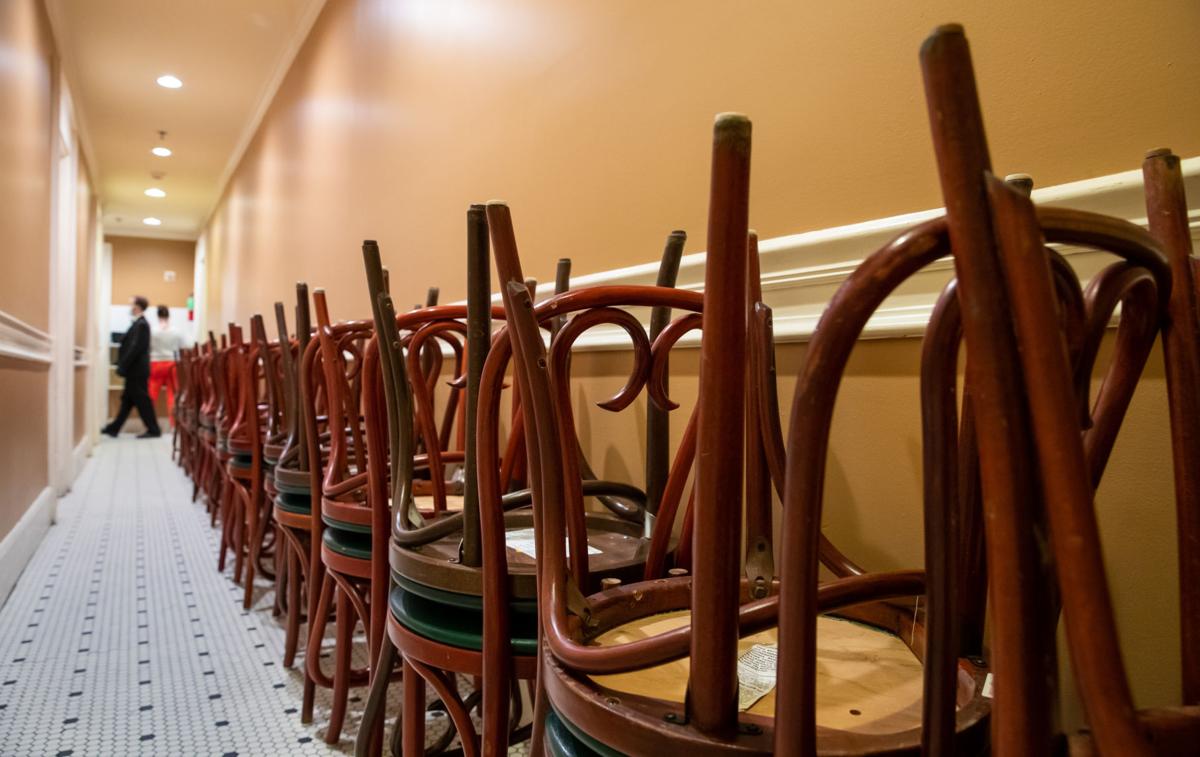What can save restaurants? Melvin Rodrigue has an answer after meeting with Trump

Chairs line a back hallway that are used when the dining room is configured with all the tables at Galatoire’s Restaurant on May 20, 2020.
- STAFF PHOTO BY DAVID GRUNFELD

A motorcyclist cruises past historic Tujague’s Restaurant (established 1856) and others boarded up businesses in the French Quarter, closed amid the coronavirus pandemic in New Orleans, Saturday, March 28, 2020.
- STAFF PHOTO BY SOPHIA GERMER
While restaurants are beginning to reopen, the next question is how long they can stay in business. Contending with phased coronavirus restrictions, shaken consumer confidence and tourism, and business travel at a standstill, the fear is that restaurants will reopen, and rehire, only to close permanently.
One solution could be more time to ramp up slowly, with help for a longer haul. Some industry leaders believe they’ve found a way to buy that time by recasting the Payroll Protection Program.
Fresh from a White House meeting on Monday with President Donald Trump this week, restaurant industry advocates are now trying to build support for a move to extend the terms of the program. It’s a move they believe can change the odds now stacked against them.
“It’s not going to be an easy road for restaurants or employees, but what this does is gives us staying power,” Melvin Rodrigue, CEO of Galatoire’s Restaurant, said Wednesday. “It allows a bridge to get to where we need to be, when revenues hopefully will be higher and we can do more business.”

Evan Vucci
Rodrigue was part of a delegation that met with the president for a round table discussion on May 18. Rodrigue is also chairman this year of the National Restaurant Association, the industry’s main lobbying group.
The round table group, composed mostly of executives from large chains along with a few independent operators, were united in calling for an extension of the terms of the program from eight weeks to 24 weeks.
The Payroll Protection Program was conceived to support businesses across different industries with cash while putting laid-off employees back to work. Its funds are structured as loans that convert to grants if businesses spend 75% of the money on payroll expenses by the end of the term.
The original parameters present a conundrum for many types of restaurants however, because they cannot yet reopen fully and don’t know how much business they’ll see.
What Rodrigue and others pitched at the White House was more flexibility for restaurants to use the same amount of money. Moving the deadline to use the money, and rehire staff, builds in time for restrictions to loosen, business to return and maybe even some of tourism and travel to come back, they argued.
“Employees are first and foremost in this,” Rodrigue said. “The real job security is with places not going out of business. We need restaurants to stay in business through this so people have a job in December. This lengthens the time we have to get there.”
His argument gets to the dilemma faced by restaurants across the spectrum, whether they’ve secured federal loans or not. Getting back open now is challenging but does not signal victory. The months ahead, as these businesses navigate changing rules, health outcomes and their customers’ comfort levels, will be their test.
The National Restaurant Association reports that two out of three restaurants employees are out of work, or about 8 million people. The group estimates industry wide sales in April were half what they’d been in February, the last full month before the pandemic hit the U.S., and the lowest level in 35 years.
The program proposal appears to have found a receptive audience in the White House. During the round table discussion, Treasury Secretary Steve Mnuchin said the administration was working on a “technical fix” to extend program terms and indicated that the move had bipartisan support. He did not commit to a 24-week period however.
Industry lobbyists are pushing for the changes in Washington, D.C., and marshaling support from restaurant operators around the country. On Wednesday, the day Galatoire’s reopened its own dining rooms on Bourbon Street, Rodrigue was on the phone with lawmakers explaining the benefit of the change.
“What we asked for, and what he committed to, is crucial,” Rodrigue said Wednesday, referring to the president. “If we can get the 24 weeks, it gives us that staying power we need.”
Editor’s note: John Georges, who owns The Times-Picayune | New Orleans Advocate with his wife, Dathel, is a partner in Galatoire’s.




